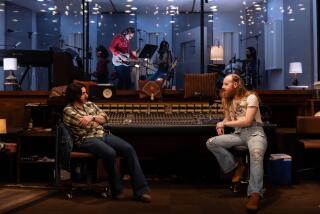STAGE REVIEW : ONE MAN’S ‘HEMINGWAY’: HE’S STILL A STRANGER
- Share via
He was probably the most lurid earlier 20th-Century example of the artist corrupted by celebrity. He played at soldiering. He was a sometime boxer--or at least a brawler--an outdoorsman, hunter and fisherman, bullfight aficionado, war correspondent, saloniste of sorts and one of the giants of American literature during one of its greatest chapters.
Next to Mark Twain, nobody did more to forge a pure American idiom in prose than Ernest Hemingway; at its best, his writing had the clarity and freshness of a brook. He was such a paradigm of machismo that a generation of writers who followed him had a tough time separating the expression of their talent from the measuring of their manhood. He bristled on the world stage, and took himself off it with a shotgun blast in the mouth.
In short, any good Hemingway biography would have plenty of ways to go. It’s a pity that Erv Johnson’s one-man show at the Off Ramp Theatre, “E. Hemingway,” stops at the crossroads and doesn’t take a step in any particular direction.
Johnson lists himself as managing director of the Boise Little Theatre and as having been instrumental in founding the Idaho Shakespeare Festival. He also runs a public relations firm, which seems apropos here.
He is of an age and appearance to suggest the mature Papa at the peak of his acclaim, and he’s a polished and well-spoken actor as well. But it’s a public relations Hemingway who greets us, shares opinions and anecdotes and tells us what it was like to visit Gertrude Stein and to have befriended the Kraut (Marlene Dietrich) and the Swede (Ingrid Bergman).
Johnson’s modulated, avuncular, fond tone doesn’t let us in on the furies that charged the engine of Hemingway’s ambition--the force that made him write with such discipline also gorged him with nasty jealousies. What are we to make of Johnson’s changeless expression when his Hemingway tells us he never had an unhappy day in his childhood, and a moment later we learn that Hemingway’s father killed himself? And what kind of parents had Hemingway’s older sister pose as his twin?
Johnson’s script is of a piece with his acting. The anecdotes don’t play so much as they come to us overheard; the evenness of dramatic tone sifts into everything, like a fine dust. Hemingway’s report on being seriously wounded in Italy, for example, is delivered in a rhythm and tone not unlike another report on the running of the bulls in Pamplona.
The public Hemingway exerted an enormous pull on many of his contemporaries, and many more people who followed. The world had never been at war quite the way it was in 1914; a part of Western Civilization had been left in the trenches. What Hemingway offered, for a while at least, was a way of living and creating in the new world, of trusting one’s senses to reveal the truth of one’s experience, of finding what you were capable of in extremis, of discovering the value of life in the face of death.
Before he became a parody of himself, Hemingway was probably the most parodied author America ever knew. But when Johnson’s Hemingway tells us toward the end, “If I can’t exist on my own terms, existence is impossible,” we don’t know what he’s talking about. Just what were Hemingway’s terms? What’s going on inside this bluff John Wayne of American letters? “E. Hemingway” is a pleasant enough experience in the theater, but we part strangers. (G. L. Scott directs.)
Performances Thursdays through Saturdays at 8 p.m., Sundays at 2:30 p.m. at 1953 N. Cahuenga Blvd., (213) 465-8059. Runs indefinitely.
More to Read
The biggest entertainment stories
Get our big stories about Hollywood, film, television, music, arts, culture and more right in your inbox as soon as they publish.
You may occasionally receive promotional content from the Los Angeles Times.










